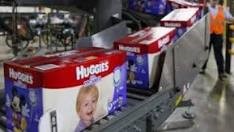Kimberly-Clark, a prominent American multinational corporation specializing in personal care products, has revealed its decision to withdraw from Nigeria after nearly 40 years of operations in the country.
The company, known for manufacturing diapers and sanitary pads, is set to announce the forthcoming shutdown of its production facility in Ikorodu, just two years after investing $100 million in the Nigerian market.
Kimberly-Clark confirmed it will close both its manufacturing plant and commercial office in Lagos. Consequently, it will cease the production, marketing, and sales of its Huggies® and Kotex® brands in Nigeria.
Insiders from the company informed Nairametrics that since late 2023, the plant has been operating below its capacity due to the challenging economic conditions prevailing in the country. This has significantly impacted the feasibility of maintaining operations at the current scale.
In 2022, Kimberly-Clark inaugurated a state-of-the-art $100 million production facility in Ikorodu, Lagos State, marking a significant investment aimed at reviving its operations in Nigeria. This move came after a similar closure in 2019, which resulted from a strategic review of its business activities.

Kimberly-Clark initially commenced operations in Nigeria in 2012. However, due to unfavorable economic conditions, the company halted its operations in 2019 after seven years of activity. Following a period of reassessment and planning, the company decided to restart its operations in 2021, reflecting its commitment to the Nigerian market.
The company is renowned for producing a range of hygiene and personal care products, including Huggies diapers and Kotex sanitary pads. Kimberly-Clark is publicly traded on the New York Stock Exchange, with a substantial portion of its shares owned by major institutional investors such as BlackRock Inc., Vanguard Group, and Morgan Stanley.
A source, who chose to remain anonymous, revealed that since late 2022, Kimberly-Clark has faced significant challenges due to high energy costs and the increasing prices of raw materials. Additionally, there has been a noticeable decline in customer demand, exacerbated by the prevailing economic conditions in the country. These factors have severely impacted the company’s ability to maintain profitable operations in Nigeria.
These challenges have led to significant downsizing and a reduction in production days, with operations now limited to Mondays through Thursdays instead of running every day of the week.
The company currently incurs around ₦100 million each month on power generation alone, not including additional maintenance costs. Overall, its monthly fixed operational expenses have surged to over ₦500 million.

He said, “Our first two years were fantastic in terms of sales growth and market share within the diaper industry. Fast forward to late 2022 and 2023, and those were really bad years for the company due to the economic situation.”
The planned closure of Kimberly-Clark’s operations in Nigeria echoes the experiences of other manufacturers who have exited the country in recent years. The reasons behind these exits are strikingly similar, including high production costs, currency depreciation that hampers the import of raw materials, and the weakened purchasing power of the population.
This impending shutdown represents a significant setback for the federal government’s efforts to attract foreign direct investment. It highlights the persistent challenges faced by businesses operating in Nigeria’s real economy. Moreover, the cessation of Kimberly-Clark’s production in Nigeria means that two of the three leading companies in the diaper and personal care industry, Procter & Gamble (P&G) and Kimberly-Clark, have ceased their local manufacturing operations within the past year. This trend underscores the broader difficulties confronting the sector and raises concerns about the sustainability of manufacturing investments in the country.
Following a similar path as GSK, Procter & Gamble (P&G) shifted towards an import-centric business model. If Kimberly-Clark (KC) follows suit, it could intensify the financial burden on households and caregivers, particularly regarding the affordability of diapers and sanitary products for babies and households. This would be particularly challenging given the substantial depreciation of the Naira. Additionally, such a move would likely contribute to an increase in the country’s reliance on imports at a time when there is a strong push for promoting local production and self-sufficiency.
This scenario underscores the delicate balance between economic realities and national development priorities, highlighting the complexities faced by multinational corporations navigating Nigeria’s business landscape.
Sources
- https://www.vanguardngr.com/2024/05/just-in-like-gsk-huggies-exits-nigeria-after-14-years/amp/
- https://nairametrics.com/2024/05/30/huggies-maker-kimberly-clark-to-stop-production-three-years-after-investing-100m-in-nigeria/?amp=1
- https://businessday.ng/news/article/huggies-makers-kimberley-clark-exits-nigeria-after-14-years/




